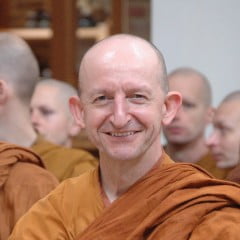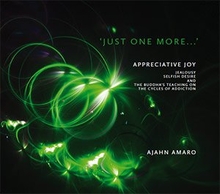This small book is the third in a series of four, consisting of reflections and practices related to the ‘sublime abiding places for the heart’ – the four brahma-vihāras, in Buddhist parlance. The vision for the series is to explore these sublime abidings via the somewhat oblique approach of looking at what counters or muddies their activity. In this third book we will be investigating muditā through the lens of self-centred desire and its relationship to dissatisfaction; how the quest to fulfil personal cravings leads not to joy but rather to pain-haunted addictions; how joy, instead, comes from unselfishness, giving and consciously delighting in the blessings that others have; how those blessings of others need not feed a sense of lack or unworthiness in us but rather, marvellously and mysteriously, be a contributor to our own well-being.

Ajahn Amaro
Born in England in 1956, Ajahn Amaro received his BSc. in Psychology and Physiology from the University of London. Spiritual searching led him to Thailand, where he went to Wat Pah Nanachat,...
阅读更多
亦由 Ajahn Amaro 提供

จิตคือทุกสิ่ง
2025 — ไทย

Happily Ever After. 1 Reality
2024 — English

Happily Ever After. 3 People
2024 — English

Happily Ever After. 2 Emotion
2024 — English

Happily Ever After. The Anthology
2024 — English

Happily Ever After. 5 Beyond
2024 — English

Happily Ever After. 4 Money
2024 — English

Navegando Una Sociedad Polarizada
2024 — Español

Hinein-Hören
2024 — Deutsch

Raízes e Correntes
2022 — Português

Auf den Geist kommt’s an
2022 — Deutsch

La Revelación
2022 — Español

อุเบกขา ธรรมสุดท้าย
2022 — ไทย

Serenity Is the Final Word
2022 — English

Cheminer Vers la Paix Intérieure
2022 — Français

L’Écoute Intérieure
2022 — Français

Catastrophe/Apostrophe: L’enseignement du Bouddha sur la...
2022 — Français

突破入流初果
2022 — 中文(简体)

Die Insel
2022 — Deutsch

ทางสายกลาง หรือ ทางสายฉัน
2022 — ไทย

My Way or The Middle Way
2022 — English

Copper Isle Miles
2021 — English

Kāmanīta, el peregrino
2021 — Español

Mind Is What Matters: the Phenomenological...
2021 — English

การให้อภัย และความกรุณา
2021 — ไทย

Forgiving and Compassion
2021 — English

Кто покормит мышей?
2021 — Pусский

Io ho ragione, tu hai torto!
2020 — italiano

ยิ่งน้อย ยิ่งมาก
2020 — ไทย

Less is More
2020 — English

¡Yo Tengo Razón, Tú Estás Equivocado(a)!
2020 — Español

Petit Bateau Grande Montagne
2020 — Français

Solo Uno Más…
2020 — Español

No Empujes – Solo Utiliza El...
2020 — Español

¿Quién Está Tirando De Los Hilos?
2020 — Español

Visión Amplia, Corazón sin Límites
2020 — Español

Solo lo maravilloso permanece
2020 — Español

小乘、大乘、 金剛乘和大道
2019 — 中文(简体)

The Lesser, The Greater, The Diamond...
2019 — English

ไม่แน่!
2019 — ไทย

Not Sure!
2019 — English

Emptiness and Pure Awareness
2019 — English

สุญญตา และการตระหนักรู้อย่างแท้จริง
2019 — ไทย

Mara and the Mangala
2019 — English

สายธารแห่งสายธรรม
2018 — ไทย

A Generous Heart
2018 — English

บุญ
2018 — ไทย

ตามใจมาเติมสุข
2018 — ไทย

Who Will Feed the Mice?
2018 — English

รำลึกซึ้ง
2018 — ไทย

La Isla: Una antología de las...
2018 — Español

Den fehlenden Frieden finden
2018 — Deutsch

L’Ascolto Interiore – Meditazione sul Suono...
2017 — italiano

The Hush At The End Of...
2017 — English

Roots and Currents
2017 — English

¿Quién Alimentará Los Ratones?
2017 — Español

Atammayatā – La última palabra del...
2017 — Español

La Escucha Interior – Meditatión en...
2017 — Español

The Breakthrough
2017 — English

The Pilgrim Kamanita
2017 — English

La Práctica de la Paz Interior
2016 — Español

Who is Pulling the Strings?
2016 — English

Phra Videsabuddhiguṇa (Venerable Ajahn Amaro)
2016 — English

Don’t Push – Just Use the...
2016 — English

I’m Right, You’re Wrong
2016 — English

For the Love of the World
2016 — English

Inner Listening
2015 — English

Finding The Missing Peace
2015 — English

Inner Listening – Sinhala
2015 — සිංහල

Introduzione Ajahn Chah
2014 — italiano

Piccola Barca, Grande Montagna
2014 — italiano

Rain on the Nile
2013 — English

Tudong, The Long Road North
2013 — English

Rugged Interdependency
2013 — English

An Introduction to the Life and...
2013 — English

Silent Rain
2011 — English

The Island
2008 — English

Like A River
2008 — English

Kleines Boot, erhabener Berg
2007 — Deutsch

Le Pèlerinage de Kamanita
2004 — Français

Small Boat, Great Mountain
2003 — English

小船與大山
2003 — zh-TW

Broad View, Boundless Heart
2001 — English



